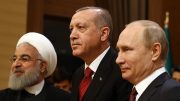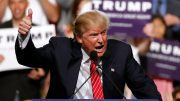- More by Michael Al-Said
A total of 125 countries have signed up to the Belt and Road Initiative
Al-Sahawat Times | Ethical Global News from Oman and UAE | Donate HERE
Advertisement – Advertise here from OMR 100 / $275 USD
As President Xi allays debt concerns, analysts say the project’s success requires foresight and honesty from all sides.
A total of 125 countries have signed up to the Belt and Road Initiative.
Ramped-up efforts to rebrand China’s mammoth Belt and Road Initiative (BRI) were in full swing this week as the country hosted a giant forum and President Xi Jinping touted the benefits of multinational cooperation and sustainable infrastructure while pointing to efforts to address concerns.
The size and breadth of The Second Belt and Road Forum for International Cooperation in Beijing, which covered everything from environmental policy to corruption and China’s lending practices, underscored the effort China is putting on recreating the image of the BRI.
Beyond the hundreds of meetings and the agreements signed, photo-ops with three dozen heads of state, and promises of both private and public investment into infrastructure and trade, Xi took pains to underscore China’s good intentions and commitment to transparency and building “high-quality, sustainable, risk-resistant, reasonably priced, and inclusive infrastructure”, as he said during his keynote speech on the opening day of the three-day forum.
He worked hard to assuage increasingly loud fears that the BRI is a vehicle for China to extend its influence and make some money in the process, repeating this message during a leader’s roundtable and a rare meeting with journalists on Saturday afternoon.
Xi said a total of $64bn worth of agreements had been signed during the forum, but he gave no details or acknowledged who signed them. The initiative – which he launched in 2013 – is “in sync with the times and widely supported”, he said.
“It looks like this is a sort of readjustment of the original One Belt One Road, now the BRI,” said Bruno S Sergi, an instructor on the economics of emerging markets and the political economy of Russia and China at Harvard University and an associate at the Harvard Davis Center for Russian and Eurasian Studies.
“Zero corruption, green, multilateral, quality, sustainability are the new glossary terms of the Chinese president,” said Sergi. “No doubt these new terms point in the right direction.”
The forum shed little light into whether all these new terms translate into more than speeches and a large marketing effort.
At six years old, it is still early days for a plan that is very long term, said Sergi.
To date, about $90bn have been invested in multiple BRI-related projects, but several hundred billion more have been loosely committed and it will be years before all that capital is invested, even though China’s two policy banks have more than $300bn in outstanding financing.
The plan has certainly attracted attention and 125 countries have signed up.
Italy joined, at the end of March, the first major European economy to do so.
But the backlash over the past couple of years has grown. Some countries worry that China is forcing them into a debt trap, or that the plan is another form of colonialism.
Malaysia cancelled some BRI projects allegedly linked to corruption. Turkey skipped the forum citing fears of debt-trap diplomacy.
In Montenegro, BRI financing has drastically expanded national debt.
Xi took pains to address these concerns at the forum by committing to ensuring both environmental and financial sustainability in projects and investments.
Still, it remains hard to pin down exactly what the BRI is and what benefits it will generate, not because there aren’t any but because the initiative is so big that it defies easy definition.
At the forum, Xi linked the BRI to connectivity and cooperation, to the “challenges and risks confronting mankind”, global economic growth, international trade and investment, governance, multilateralism, green development and innovation.
He committed to inviting 10,000 representatives of “political parties, think-tanks and non-governmental organisations”, expand market access, enhance intellectual property protection, boost imports, engage in macro-economic policy coordination, and greater opening up.
The BRI may have started out as ostensibly an investing and lending programme for infrastructure but it has evolved into a catch-all for virtually everything China does abroad, blending the lines between economics, politics and military into one giant programme, said Joshua Eisenman, an assistant professor at the Lyndon B Johnson School of Public Affairs at The University of Texas at Austin, and a China expert who has followed the BRI since its inception.
“Over time BRI has evolved into a moniker for everything,” Eisenman said. “When people ask ‘will the BRI work?’ What they are essentially asking is ‘will Xi Jinping’s foreign policy work?'”
Nevertheless, China is filling a funding gap that exists for many countries, particularly emerging economies.
It is a gap that, at least for the time being, no other large economy seems to be willing to fill and in so doing, is lending huge amounts to countries that may not necessarily be able to afford to maintain those loans.
“When the option is to take money or don’t take money, people will take the money every time,” said Eisenman.
Still, for all its pros and cons the BRI may be a vehicle for a new type of national entrepreneurship, said Sergi.
For the effort to be effective the BRI will require “equal efficiency and foresight on the part of the many countries and actors interested in the new Silk Road”.
“Only a commonly felt new approach that moves things in the proper direction could make the BRI a gigantic win-win solution towards better infrastructure, growth and progress and to avoid hegemonic or predatory forms, on the one hand, and prevent indebtedness in some countries as well,” Sergi said.
He suggested the jury is still out on the ultimate effect of the BRI and will be out for a long time to come.
“It looks like the BRI is becoming a ‘waiting for Godot vision’. While a powerful long-term vision, it requires that all actors from the Chinese side and all other countries act with care and commitment to honesty and discernment.”
Since you’re here …
… we have a small favour to ask. More people are reading Al-Sahawat Times than ever but advertising revenues across the global media industry are falling fast. And unlike many news organisations, we haven’t put up a total paywall. We want to keep our journalism as open as we can. So you can see why we need to ask for your help. Al-Sahawat Times’ independent, investigative journalism takes a lot of time, money and hard work to produce. But we do it because we believe truly ethical media and an unbias perspective really matters.
“I appreciate there not being a paywall: it is more democratic for the media to be available for all and not a commodity to be purchased by a few. I’m happy to make a contribution so others with less means still have access to information.”
If everyone who reads our reporting, who likes it, helps fund it, the future of ethical media and the futures of our staff and their families would be much more secure. For as little as £1, you can support Al-Sahawat Times and it only takes a minute. Thank you.
This story is available on:
APPLE NEWS | GOOGLE NEWS | AL-SAHAWAT TIMES
Talk to a journalist
Email: NewsDesk@alsahawat.com
Web: alsahawat.com
Follow Al-Sahawat Times
?Read it on FLIPBOARD
Views: 0







